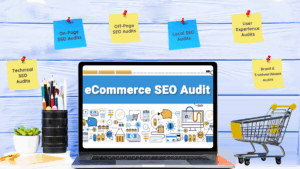In today’s competitive landscape, professional service providers must embrace digital marketing to thrive. Whether you are a law firm, accounting practice, medical clinic, or consultancy, having a strong online presence is no longer optional—it’s essential. Traditional marketing methods like word-of-mouth and referrals are still valuable, but they are no longer enough to sustain growth. The digital space offers endless opportunities to attract, engage, and convert clients. However, many professionals struggle with navigating the complexities of digital marketing. From search engine optimization (SEO) to social media engagement and content marketing, every element must work cohesively to establish authority and generate leads.
Building a Strong Digital Presence
The foundation of digital marketing for professional services begins with a well-optimized website. Your website acts as the digital front door of your business. It must be visually appealing, easy to navigate, mobile-friendly, and filled with valuable content that educates and informs potential clients. Having service pages that detail your offerings, an informative blog section, and clear calls-to-action (CTAs) are crucial. A digital marketing audit can help identify gaps in your website’s performance, ensuring it meets the latest SEO and user experience (UX) standards. If you haven’t already performed an audit, check out this comprehensive guide to digital marketing audit services to help you improve your site’s effectiveness.
Beyond having a great website, optimizing it for search engines is a must. Search Engine Optimization (SEO) ensures that your website ranks higher on Google and other search engines, making it easier for potential clients to find you. Keywords related to your industry should be incorporated naturally into your content. For example, if you are a law firm specializing in family law, using terms like “best family lawyer near me” or “divorce attorney consultation” can improve your search rankings. Additionally, local SEO strategies, such as Google My Business optimization and acquiring client reviews, will help professionals target customers in their geographic location.
Leveraging Content Marketing for Thought Leadership
Content marketing is a powerful tool for professional service providers. Unlike product-based businesses that focus on direct selling, professional services thrive on trust and credibility. Creating valuable content such as blogs, case studies, whitepapers, and videos helps showcase your expertise and attract potential clients.
A well-structured blog can drive organic traffic to your website. By answering common industry-related questions, you position yourself as a trusted expert in your field. For instance, a financial advisory firm might publish content about “how to prepare for retirement” or “tax-saving strategies for business owners.” These topics not only provide value to readers but also establish the firm’s authority. If you’re unsure about the effectiveness of content marketing versus social media marketing, this detailed comparison of content marketing and social media marketing provides insights into which strategy suits your business goals.
Another effective form of content marketing is video marketing. Professionals can use platforms like YouTube and LinkedIn to share short, educational videos about industry trends, client success stories, or even behind-the-scenes insights into their services. Video content tends to generate higher engagement compared to text-based content alone.
Harnessing the Power of Social Media Marketing
Social media is an essential component of digital marketing for professional services. While many professionals believe social media is more suited for B2C businesses, platforms like LinkedIn, Facebook, and even Instagram offer immense opportunities for B2B networking and brand awareness.
LinkedIn, in particular, is a goldmine for professional service providers. By sharing valuable insights, engaging in discussions, and networking with potential clients or partners, you can establish your presence as an industry leader. Regularly posting informative content and participating in LinkedIn groups related to your field can enhance visibility. For example, a business consultant could share case studies on successful business transformations or write articles about strategic planning for startups.
Facebook and Instagram, though more visually oriented, can still benefit professional services. Law firms, medical professionals, and even accounting firms use these platforms to showcase client testimonials, live Q&A sessions, and industry updates. Interactive content like polls, quizzes, and live sessions help foster engagement and build trust. If you want to test your knowledge of social media strategies, this social media marketing quiz can help you identify areas for improvement.
Paid Advertising for Targeted Lead Generation
While organic strategies are vital, paid advertising can significantly accelerate lead generation. Google Ads and social media ads allow professional service providers to reach their ideal audience with precision. Google Ads, especially for service-based businesses, can be a game-changer when executed correctly. By targeting keywords that potential clients are searching for, such as “best personal injury lawyer near me” or “top-rated accounting firm,” businesses can ensure their ads appear at the top of search results.
Facebook and LinkedIn ads also provide targeted advertising options based on demographics, job titles, interests, and behaviors. For example, a corporate law firm can run LinkedIn ads targeting business owners, CEOs, and HR executives who might require legal services. Meanwhile, a dental clinic could use Facebook ads to reach people within a specific geographic area who are looking for dental implants or cosmetic procedures. If you’re interested in cost-effective strategies, affordable digital marketing services can help small businesses maximize their budget while achieving significant results.
Reputation Management and Online Reviews
Reputation plays a critical role in the success of professional service providers. Clients rely heavily on online reviews and testimonials before choosing a service. A strong online reputation not only attracts new clients but also enhances trust and credibility.
Encouraging satisfied clients to leave reviews on Google, Yelp, and industry-specific platforms is crucial. Additionally, promptly addressing negative feedback and resolving client concerns demonstrates professionalism and commitment to customer satisfaction. Public relations (PR) efforts, such as guest appearances on podcasts, speaking at industry events, or being featured in authoritative publications, also contribute to a strong professional reputation.
Email Marketing for Client Retention and Nurturing
Email marketing remains one of the most effective channels for client retention. Unlike social media, where your audience might not see every post, email ensures direct communication with your clients. Sending newsletters with industry insights, updates about your services, and personalized offers helps maintain engagement. For instance, a legal firm can send out monthly newsletters with changes in legislation that might affect their clients, while a medical practice can share seasonal health tips.
Segmentation is key to successful email marketing. By categorizing your email list based on client needs and behaviors, you can send targeted messages that resonate with specific groups. For example, a tax consultant might have separate email campaigns for small business owners, freelancers, and corporate clients, each receiving content relevant to their tax obligations.
Conclusion
Mastering digital marketing for professional services requires a strategic approach that combines SEO, content marketing, social media, paid advertising, and reputation management. By leveraging these tactics, service-based businesses can attract more clients, establish thought leadership, and stay ahead of the competition. If you’re just starting your digital marketing for professional services journey, seeking expert guidance can make a significant difference.
For further insights into digital marketing strategies, check out this guide on digital marketing best practices. Implementing the right digital marketing strategies will ensure long-term success and sustainable growth for your professional service business.








